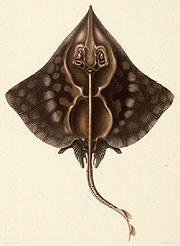| Date: | 1845. |
| Form: | Two stanzas of six lines (each containing two four-stress + one three-stress + two four-stress + one three-stress lines), rhyming aaBccB and with the alliteration pattern 2121. |
| Manuscript: | ÍB 13 fol., where the poem has no title (facsimile KJH236; image). |
| First published: | 1847 (A194; image) under the title "Helvíti" ("Hell"). |
In the manuscript, the last line of the poem originally read: "Dead souls eternally alive." Jónas later altered this to "Satan [and] dead souls."
The notion that hell consists of alternating torments of heat and cold — that the damned "must walk between frost and flame" ("Sólarljóð," strophe 18), doomed forever
To bathe in fiery floods, or to reside
In thrilling region of thick-ribbèd ice
(Shakespeare, Measure for Measure) — is very ancient.1
Hell as a literally existing place where souls will be tormented after death plays no role in Jónas's thought. In his day the hell-terrors introduced into Iceland after the Reformation had pretty much subsided. And he had recently been reading in Feuerbach about the fictiveness of theological geography — not specifically hell, it is true, but its counterpart heaven:
Die alte Fabel lehret zwar,
Ich käme zu der Engel Schar;
Doch solches glauben nur Theologen,
Die um die Wahrheit sich längst betrogen. (
1FFS360-1)
But though hell may have been well-nigh extinct for Jónas as a theological category,2 it was still very much alive for him as a poetic myth (see, for example, "The Solitary").
Both the meter of this poem and its rhyme scheme (aaBccB) are similar to those of Jón Þorláksson's "The Short Lullaby of Devils" (AAbCCb), the subject of which is Satan, hell, devils (and the assault of the latter on Magnús Stephensen). Jón's poem, which Jónas probably read over the winter of 1841-2, clearly furnished him with hints for his elegy on Magnús Stephensen (written 1842; not included in this collection) and may have left its mark on the present poem as well.
Notes
1 It goes back to Job 24:19 in the Vulgate Bible (Ad nimium calorem transeat ab aquis nivium, literally "let him pass from the waters of snows into excessive heat"), as interpreted by St. Jerome (Commentarius in Librum Job, Patrologia Latina, XXVI, col. 685).
2 Late in life Konráð Gíslason suggested (BKG294) that the last two lines of Jónas's late poem "Síra Bessi" (1E212) showed he believed in hell. It is always perilous to challenge Konráð's interpretations of his friend's poetry — but it seems clear that "Síra Bessi" is satiric (Matthías Þórðarson places it among Jónas's humorous poems) and tends to confirm Jónas's skepticism about hell.
